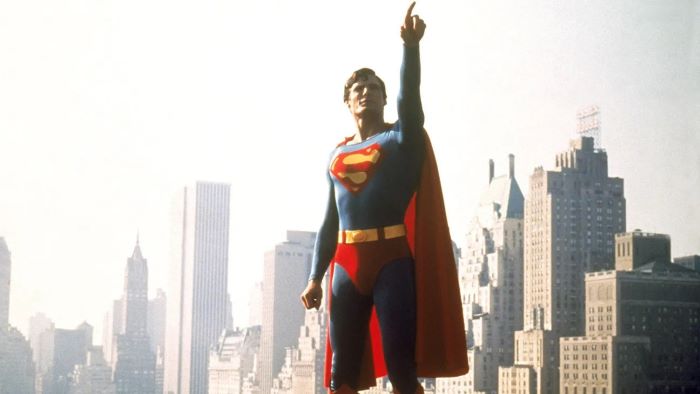![]() The tagline for 1978’s Superman: The Movie was “You’ll believe a man can fly.” While the movie’s special effects played a big role in cementing that belief, the late Christopher Reeve’s performance elevated his seminal blockbuster to another level entirely. Reeve embodied the confidence and nobility of the crime fighter and his bumbling Clark Kent persona so flawlessly that, more than 45 years later, pop culture still regards him as the definitive Superman. Every Superman successor in film and television, not to mention the entirety of superhero castings from Tim Burton’s Batman to the Marvel Cinematic Universe, has been chasing Reeve’s shadow.
The tagline for 1978’s Superman: The Movie was “You’ll believe a man can fly.” While the movie’s special effects played a big role in cementing that belief, the late Christopher Reeve’s performance elevated his seminal blockbuster to another level entirely. Reeve embodied the confidence and nobility of the crime fighter and his bumbling Clark Kent persona so flawlessly that, more than 45 years later, pop culture still regards him as the definitive Superman. Every Superman successor in film and television, not to mention the entirety of superhero castings from Tim Burton’s Batman to the Marvel Cinematic Universe, has been chasing Reeve’s shadow.
That synonymousness made Reeve’s tragic equestrian accident in 1995 all the more shocking. The man who brought the unbreakable Superman to life was now paralyzed and confined to a wheelchair and ventilator for the rest of his life. Yet, despite his initial anguish, Reeve persevered to become a nationwide advocate for disability research, retaining Superman’s Golden Age status as a champion of the little guy. Super/Man: The Christopher Reeve Story approaches this part of Reeve’s story with an unflinching, yet humanizing gaze. In doing so, directors Peter Ettedgui and Ian Bonhôte (McQueen) deliver one of the year’s best and most heartbreaking documentaries.
Super/Man doesn’t just consult Reeve’s friends and family for insight. It also utilizes audio of Reeve’s 1998 autobiography Still Me to put viewers in the actor’s headspace pre- and post-accident, an accident that could have resulted in death or no injury had he landed just a little off to one side or another. Reeve’s initial reactions are devastating, lamenting the things he could no longer do—from holding his kids to being intimate with his wife Dana—and his future. His injuries, meanwhile, are depicted by the occasional surrealistic animated visual of Reeve’s body drifting through the cosmos, the immobilized body parts represented by kryptonite-inspired green cracks in his flesh. An uncomfortable, if not comic-accurate, visual if there ever was one.
However, the film is not doom and gloom, but an embodiment of the best of humanity amid the direst of hardships, a sentiment reiterated by Reeve’s kids Matthew, William, and Alexandra; his former partner Gae Exton; longtime friend Michael Manganiello; co-stars Jeff Daniels and Susan Sarandon; and more. Cutting between his early and later years, we learn about Reeve’s dysfunctional family troubles and his time at Juilliard alongside classmate Robin Williams, who would become one of his strongest emotional anchors following the paralysis accident. Glimpses of roles he undertook post-Superman to avoid typecasting also demonstrate a versatility that was tragically cut short (even if he would star in and direct a few projects post-paralysis).
In other words, Reeve was more than Superman. The actor took that role at a time when few mainstream superhero films existed, confusing his father and horrifying theater co-star William Hurt (who, ironically, received a minor part in the MCU decades later) on what it meant for Reeve’s career. Of course, Superman became a global hit, but it was the actor’s mix of sincerity, gravitas, and screwball humor that made its protagonist so believable, with one son singling out a brief, yet wonderful, Superman clip of Reeve shifting his Clark posture to Superman and back as a testament to his acting skills. Superman made Reeve a symbol of hope, a status that left him uniquely skilled to represent the disabled community and mainstream disabilities research.
These scenes of hope and courage are where Super/Man feels most worthy of your tears: watching Hollywood give Reeve a massive round of applause at the 1996 Oscars in his first public post-accident appearance or his interactions with ordinary people wishing him the best of luck. Or observing just how thoroughly Reeve committed to a mission: He started the Christopher Reeve Foundation (later renamed the Christopher & Dana Reeve Foundation after Dana tragically died of lung cancer two years after her husband) and became an early advocate for stem cell research. The film doesn’t treat him as perfect—a portion of Super/Man explores how the trauma of his parent’s divorce impacted Reeve’s relationship with Gae.
Super/Man: The Christopher Reeve Story is a hard movie to watch, given its heartbreaking subject matter. However, as a film about humanity, it soars. If the original Superman movie convinced viewers a man could fly, Super/Man is guaranteed to make everyone cry.







Leave A Comment